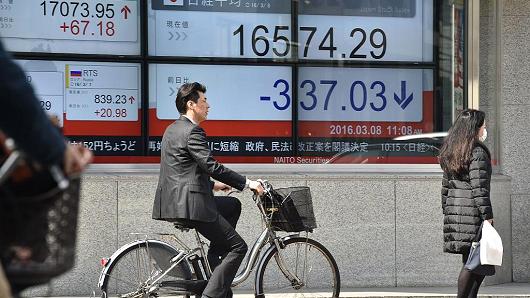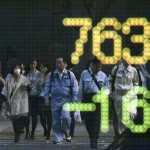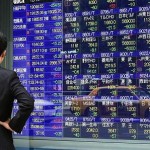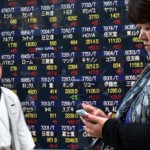Asia trades lower, with Shanghai off 2.9%, Nikkei lower by 1.3%

Most Asian markets stumbled Wednesday, with China shares dropping sharply, as analysts pointed to renewed concerns about the mainland’s economy following lower-than-expected trade data for February.
The Shanghai composite dropped 2.9 percent, while the Shenzhen composite fell 2.22 percent.
Elsewhere, the Japanese benchmark Nikkei 225 was lower by 1.32 percent, Hong Kong’s Hang Seng index fell 0.61 percent and South Korea’s Kospi was lower by 0.12 percent. Down Under, the S&P/ASX 200 bucked the trend, tacking on 0.64 percent.
“Consolidation and reflection seems to be the name of the game after a strong run in commodities and equities,” wrote IG’s chief market strategist, Chris Weston, in an afternoon note. Weston said he saw “clear concern” from clients over “whether it is time to increase bearish positioning again.”
One factor adding to investor concerns is China’s weaker-than-expected trade data.
Rodrigo Catril, a currency strategist at the National Australia Bank, said in a note, “renewed concerns over China’s economic outlook following [Tuesday’s] softer than expected trade numbers halted a five-day equity rally and triggered a bid for safe haven assets.”
China’s February trade data showed exports fell 25.4 percent on-yearand imports declined 13.8 percent, clocking far bigger slides than expected by analysts.
Catril added subsequent market reactions to the trade numbers suggest investors remain concerned over “the apparent soft demand for China’s exports.” He said it is still a little too early to draw any big conclusions, but noted March trade figures will be very important.
Among safe-haven assets, the Japanese yen maintained its strength against the dollar at the 112 handle, off levels above 113 touched Tuesday. The dollar/yen pair traded at 112.62 as of 12:24 p.m. HK/SIN time.
Major exporters in Japan were mostly down, with Toyota losing 0.3 percent, Nissan off by 1.51 percent and Honda lower by 1.21 percent. A stronger yen is usually a negative for exporters as it affects their overseas profits when converted into the local currency.
In corporate news, Japan’s Nikkei newspaper reported that Canon is a front-runner to buy Toshiba’s healthcare business, with a bid of over 700 billion yen ($6.21 billion). Toshiba is undergoing a restructuring following an accounting scandal in 2015. Other bidders for Toshiba’s healthcare business include Fujifilm, as well as a coalition of Konica Minolta and European private equity fund Permira, reported the Nikkei.
Shares of Toshiba were down 2.35 percent, while Canon shares reversed losses to trade up 0.64 percent.
Mining stocks in Australia were mixed, with major players Rio Tintodown 2.14 percent, BHP Billiton lower by 2.47 percent and Fortescuefalling 2.87 percent. Shares of South32 were up 4.44 percent.
Gold, another safe-haven asset, gave up early gains, with spot goldfalling 0.52 percent to $1,254.56 an ounce. Gold miners in Australia saw their shares slide, with Newcrest down 3.26 percent and Alacer Goldlosing 3.24 percent.
Oil prices reversed course in the afternoon session during Asian hours, with the global benchmark Brent up by 0.23 percent at $39.74 a barrel, after settling down 2.9 percent during U.S hours. U.S. crude futures were up 0.27 percent at $36.60, after falling 3.7 percent overnight.
Oil plays in the region were sharply lower, with Santos down 3.21 percent, Woodside Petroleum falling 2.61 percent, Inpex lower by 3.2 percent and Japan Petroleum losing 1.33 percent. Chinese mainland energy plays were sharply lower, with Sinopec dropping 9.51 percent and China Oilfield declining 5.29 percent.
Major U.S. indexes closed lower, with the Dow Jones industrial averageoff 0.64 percent, the S&P 500 slipping 1.12 percent and the Nasdaq composite ending down 1.26 percent.
Source: CNBC




























